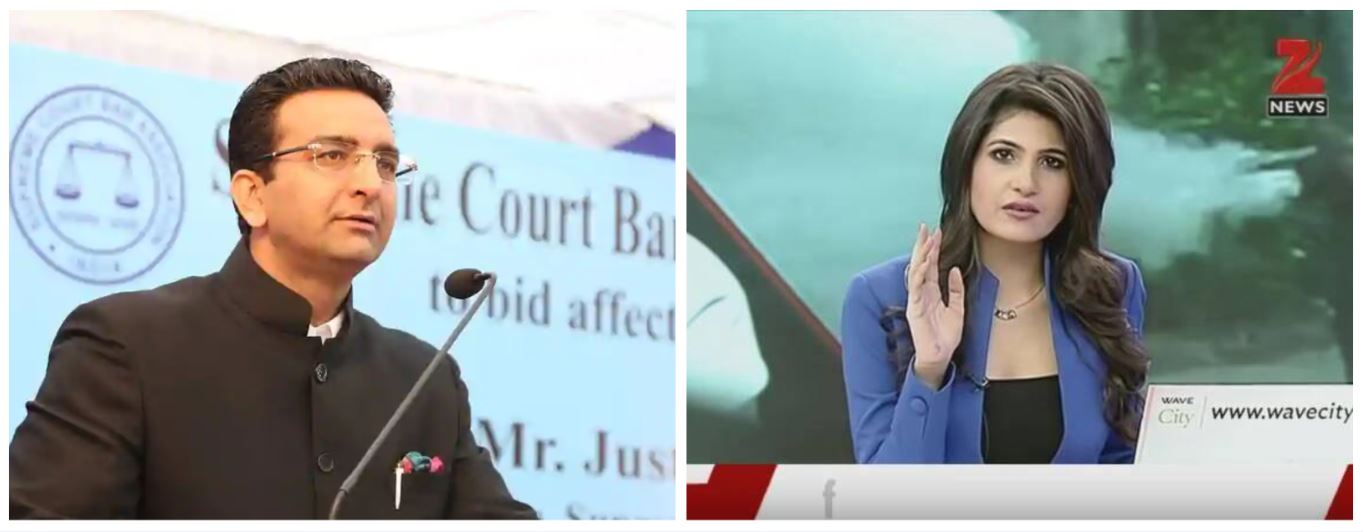On ABP News’ evening, primetime debate, BJP’s National Spokesperson, Gaurav Bhatia was called out for his sexist remarks by journalist and moderator Rubika Liyaquat. Upon Congress’ Rohan Gupta questioning the Modi government, Bhatia screamed at him to wear a petticoat and
Sharp and swift in her response, Liyaquat told Bhatia that his sexist remarks were absolutely unwelcome on her debate and that he couldn’t attack panellists for expecting answers of him. Liyaquat went onto to ask Bhatia what he was attempting to insinuate with his remark and asked why he associated cowardice with women. She demanded he apologise, asking if he thought she would condone this or remain a mute spectator.
Also read: Why Bipin Rawat Is Not Wrong: Military And Its Inherent Hypermasculinity
Castigated, but undeterred, Bhatia insisted that he didn’t owe anyone an apology and went onto say Rohit Gupta should apologise to him instead. The public reaction to this incident took a solitary tone – condemning Gaurav Bhatia and celebrating the badassery of Rubika Liyaquat:
Statements like “You’re such a woman” and “You sound like a girl” are considered insults of mighty weight when said to men.
Anything traditionally associated with women or femininity is considered insulting within patriarchies when said to men. From statements like “You’re such a woman” to “You sound like a girl!” being insults of mighty weight when said to men, who apparently are supposed to be the opposite of everything women
Everything from wearing pink to displaying emotions – things that the patriarchy claims fall in the domain of women and femininity – is considered a testimony of inferiority when done by men, because when they do so, they are apparently being like women – which, in a culture that promotes and celebrates toxic masculinity and machismo, translates to being an inferior class of person.
This belief is extended to homosexuality, as well. Things traditionally associated with women are associated with gay men, too, albeit, as an insult. This is due to the patriarchal assumption that gay men are a subordinate class of men for not subscribing to the patriarchy’s heteronormative ideal. With stereotypes about gay men ranging from them liking pink, being hysterical, invested in fashion, and big mouths, basically all things usually associated with women, these stereotypes function as a tool that claims gay men embody every traditional female trait and interests, and ergo, are inferior to straight men. This alleged inferiority of gay men to straight men is made possible by the idea of female inferiority. Gay men who are considered to be ‘basically women’ by patriarchy are only inferior because women are inferior in its eyes, to begin with.
Calling out sexism, in all its forms, no matter how subtle it might appear, is crucial to dismantling the patriarchy and to the cause of women.
Quotidian sexist diatribe targeted at men who do not subscribe to ideas of toxic masculinity is a reflection of how women and everything associated with them is demeaned in patriarchal societies. Everything exclusively associated with women is considered inferior, shameful, or ridiculous –clearly, a patriarchal control mechanism to keep women ‘in their place’ which is beneath men, at home, away from public life. But it’s continued prevalence in our times today not only gives rise to questions about how we are collectively stuck in a patriarchal rut of misogyny and toxicity but also how these mechanisms systematically shove people into moulds that confine them to
In a country where toxic masculinity and every negative consequence of it is embraced and prided, maybe it is time we realise we are shaming the wrong thing. It is considered emasculating for men to be associated with anything that’s related to women, and this bears testimony to the deeply ingrained sexism and misogyny that is still prevalent and kicking.
Also read: Decoding Rahul Gandhi’s Recent Sexist Remarks And Its Backlash
Liyaquat’s response is what we need to see more of. Calling out sexism, in all its forms, no matter how subtle it might appear, is crucial to dismantling the patriarchy and to the cause of women. The first step out of this rut of stubborn adherence to patriarchy is accountability, to out sexist men and stop giving them a free pass holds the potential to carve the path of change. In 2019 it is time petticoats and chudia stop being the representation of weakness and cowardice. In 2019, it is time women stop being the poster child of inferiority and inadequacy.




